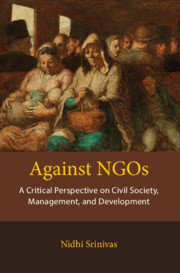Book contents
- Frontmatter
- Dedicaiton
- Contents
- List of Tables and Figure
- List of Abbreviations
- Timeline and Key Events
- Preface and Acknowledgements
- 1 Introduction: Development, Management, and Civil Society from a Critical Perspective
- 2 Colonial Development, Colonial Management
- 3 Modernization Theory, Development, Management
- 4 Dependency Theory and an Alternative Management
- 5 High Management, the Short Reign of Shared Common Sense
- 6 The Washington Consensus and Financialization of Management
- 7 Moving Past the Washington Consensus
- 8 Conclusion: Possibilities of Emancipation
- Glossary of Specialized Phrases and Terms
- References
- Index
Preface and Acknowledgements
Published online by Cambridge University Press: 29 July 2022
- Frontmatter
- Dedicaiton
- Contents
- List of Tables and Figure
- List of Abbreviations
- Timeline and Key Events
- Preface and Acknowledgements
- 1 Introduction: Development, Management, and Civil Society from a Critical Perspective
- 2 Colonial Development, Colonial Management
- 3 Modernization Theory, Development, Management
- 4 Dependency Theory and an Alternative Management
- 5 High Management, the Short Reign of Shared Common Sense
- 6 The Washington Consensus and Financialization of Management
- 7 Moving Past the Washington Consensus
- 8 Conclusion: Possibilities of Emancipation
- Glossary of Specialized Phrases and Terms
- References
- Index
Summary
One summer afternoon on a train from Athens to Thessaloniki, some years back, I met a young Pakistani man in the snack car. He was in a seat, hands over his eyes, and at times he slumped abruptly. He seemed tired. We noticed each other when boarding the train—it is not all that often two South Asian strangers travel the same six-hour route through Greece. We got talking. He helped me establish when I had to leave the train, at a stop I still find hard to pronounce, Palaeofarsalos, to change to another line for my final destination. I asked him what he did for a living and he described working in a farm hauling stacks of wheat, processing it in a mill. His wife and daughter lived outside Islamabad. Foolishly, I asked for good Pakistani restaurants in Thessaloniki. He shrugged. Few of his compatriots could afford to eat in restaurants. I recalled a vendor from Bangladesh a few weeks earlier, in Athens's Plaka, selling rubber balls. Each time you threw them they flattened into a disc, and then, after a moment, became balls again. On them was painted an image of a frog, squashed, regenerated, and squashed again. It seemed an apt image for these men, shaken, jostled by circumstance, trying to gather the semblance of a life in new settings, speaking another language.
It was as the train slowed, nearing my destination, that I asked this man a question for which I already sensed part of the answer: How did you get to Greece?
I walked here. From Islamabad he took a train to Karachi. There he joined a group of men to the Iran border, let through by guards who looked the other way. They walked at night, in small groups, by road verges. Or they paid truckers to drive them a day's length, huddling inside. In this manner, they reached the border of Iran with Turkey, Kurdistan. At this point, his voice slowed and dimmed, and all he could say was that Kurdistan was very difficult. People died. What was left of the group entered Turkey and traveled across to Edirne, the border. Twice, the Greeks caught him, returning him to the border where Turkish guards drove him a hundred miles away and left him. Each time he returned, waited, ran across. The third time he got through.
- Type
- Chapter
- Information
- Against NGOsA Critical Perspective on Civil Society, Management and Development, pp. xvii - xxPublisher: Cambridge University PressPrint publication year: 2022



